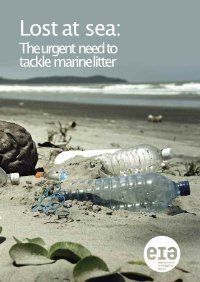Lost at Sea: The urgent need to tackle marine litter
By Environmental Investigation Agency
Lost at Sea, calls on governments, industry, retailers, and consumers to help end the appalling damage that plastic waste inflicts on marine environments.
The report details how global plastics production has grown from five million tons per year in the 1960s to 299 million tons in 2013. It is found in our clothes, computers, and cars and has now found its way to our oceans, leaving no area uncontaminated. Plastics are ingested by seabirds and other marine life, concentrated in Arctic Sea ice, and are accumulating in deep sea sediments where microplastics are now more numerous than in surface waters. An estimated 80 percent of marine litterl originates from terrestrial waste sources, but can vary depending on geographical area.
This report outlines some of the impacts on marine creatures, with recommended actions to reduce the rising tide of plastic waste entering the oceans.
London: Environmental Investigation Agency, 2015. 12 p.


